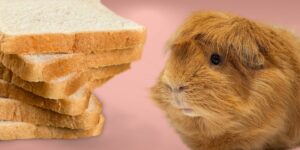The short answer is no, guinea pigs cannot eat crackers. While crackers may not be toxic to guinea pigs, they are not a suitable part of their diet. Guinea pigs have specific dietary needs, and crackers do not provide the nutrients they require to stay healthy.
What are Guinea Pigs?
Guinea pigs are small, domesticated rodents that belong to the species Cavia porcellus. They are native to South America and are popular pets due to their friendly nature and low-maintenance care requirements.
Guinea Pig Diet Basics
Guinea pigs are herbivores, which means that their diet should consist mostly of hay and fresh vegetables. In addition to hay, which provides essential fiber for their digestive system, guinea pigs also need a source of vitamin C. Unlike humans and many other animals, guinea pigs cannot produce vitamin C on their own, so it is important that they get it from their diet.
Essential Nutrients for Guinea Pigs
Fiber
Importance of Fiber for Guinea Pigs
Fiber is crucial for maintaining a guinea pig's healthy digestive system. It helps prevent gastrointestinal issues and promotes proper digestion.
Best Sources of Fiber
The best source of fiber for guinea pigs is hay, specifically timothy hay, which should make up the majority of their diet. Other high-fiber hays include orchard grass, Bermuda grass, and oat hay.
Vitamin C
Importance of Vitamin C for Guinea Pigs
Vitamin C is vital for a guinea pig's overall health, supporting their immune system, promoting skin and bone strength, and preventing a disease called scurvy.
Best Sources of Vitamin C
Fresh vegetables, such as dark leafy greens and bell peppers, are a good source of vitamin C for guinea pigs. In addition to these staples, guinea pigs can also enjoy occasional treats like fruits and vegetables. However, it is important to limit these treats to a small portion of their diet, as too much can cause digestive problems.
Foods to Avoid for Guinea Pigs
Processed Foods
Harmful Ingredients in Processed Foods
Processed foods often contain unhealthy ingredients, such as added sugars, fats, and preservatives, which can negatively impact a guinea pig's health.
High Salt Foods
Dangers of Excess Salt for Guinea Pigs
Excessive salt intake can cause dehydration and other health problems in guinea pigs. It is important to avoid giving your guinea pig foods with high salt content.
Sugary Foods
Effects of Sugar on Guinea Pigs' Health
Excessive sugar consumption can lead to digestive issues and obesity in guinea pigs. It is crucial to avoid feeding them high-sugar foods.
Crackers and Guinea Pigs
Ingredients in Crackers
Crackers are made from processed grains, such as wheat flour, salt, sugar, and oil. While these ingredients may be safe for human consumption, they are not suitable for guinea pigs.
Grains
Why Processed Grains are not Suitable for Guinea Pigs
The processed grains in crackers do not provide the fiber and nutrients that guinea pigs need, and they can also cause digestive problems if eaten in large amounts.
Salt
Health Risks of Salt for Guinea Pigs
Salt can cause dehydration and other health problems in guinea pigs, so it is important to avoid giving them salty foods like crackers.
Sugar and Oil
Potential Health Problems from Sugar and Oil
High sugar and fat content in crackers can contribute to obesity and other health issues in guinea pigs.
Seasonings and Additives
The seasonings used in crackers may be too strong for guinea pigs' sensitive digestive systems and could cause adverse reactions.
Safe Treats for Guinea Pigs
Fruits
Recommended Fruits for Guinea Pigs
Guinea pigs can occasionally eat small amounts of fruits, such as apples, pears, strawberries, and blueberries, as treats. However, be cautious of portion sizes and remove any seeds, as they can pose a choking hazard.
Vegetables
Recommended Vegetables for Guinea Pigs
Some safe vegetables for guinea pigs include bell peppers, cucumbers, carrots, and various leafy greens like romaine lettuce, spinach, and kale.
Tips for Feeding Guinea Pigs
Creating a Balanced Diet
To create a balanced diet for your guinea pig, make sure to provide plenty of hay, some fresh vegetables, and a small amount of fruit on a daily basis.
Monitoring Portion Sizes
Keep an eye on portion sizes when feeding your guinea pig, as overfeeding can lead to obesity and other health issues.
Introducing New Foods Safely
When introducing new foods to your guinea pig's diet, do so gradually and monitor their reaction to ensure they can tolerate the food without any adverse effects.
Conclusion
In conclusion, guinea pigs should not eat crackers. While crackers may not be toxic to guinea pigs, they do not provide the nutrients that guinea pigs need to stay healthy. It is important to provide guinea pigs with a diet that consists mostly of hay and fresh vegetables, along with occasional treats in small amounts. By following these guidelines, you can help ensure that your guinea pig stays happy and healthy.



